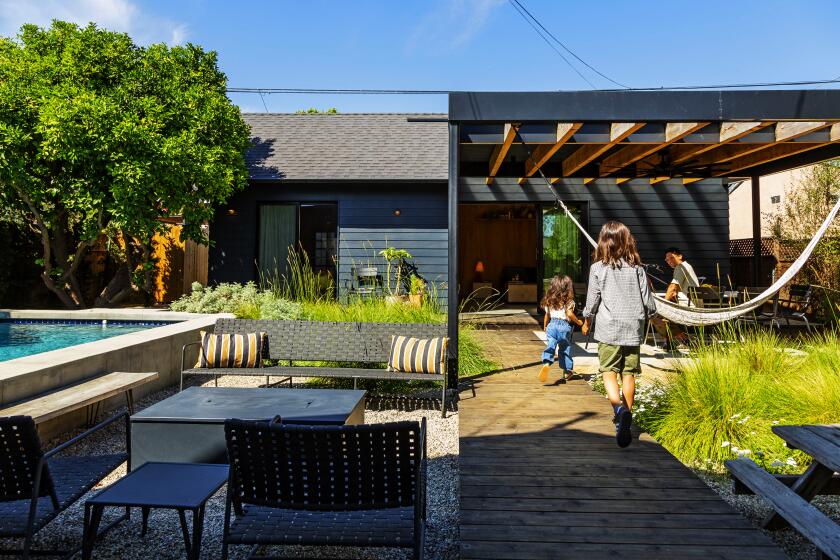Villages Could Provide Refuge for Veterans Without Homes
- Share via
Returning home is not always easy for veterans. Some stumble into a nightmare spiral of drugs, shelters and the streets. On any given night there are thousands of homeless veterans on the streets of Los Angeles County.
But an innovative project that is underway in Long Beach may provide some relief for what often appears to be an intractable problem.
Ground was broken last week on a $14-million transitional housing project for homeless veterans that will help former service members get back to work while giving them time to deal with domestic and emotional problems.
“We want to provide housing and services that will give homeless veterans the highest chance possible to re-integrate into society,” said real estate developer Tim Cantwell, president of L.A. Veterans Initiative, which operates a facility for homeless veterans in Inglewood.
The new project, called Villages at Cabrillo, will be on 26 acres of former Navy housing and will provide housing and support services for 1,000 homeless veterans, families and youths.
Many of the apartments on the old Navy property have broken windows and are in disrepair, but Cantwell said they will be converted into Mediterranean-style apartments with red tile roofs and palm trees.
Jesus Rios knows how important a role the new development can play in rebuilding broken lives.
“Sometimes the world just collapses around you,” said Rios, 49, a Vietnam-era veteran who was homeless for three years before getting help from Cantwell’s group. “I was pushing a shopping cart out there.”
Rios was caught in a downward spiral after a debilitating auto accident. He later divorced and lost his house and job.
Today, he lives and works in the kitchen at the Westside Residence Hall, the L.A. Vets Inglewood facility, where formerly homeless veterans are provided with low-rent housing, counseling services and job development assistance.
The 750-bed Villages at Cabrillo will expand on the Inglewood model, said Stephen Peck, community development director for L.A. Vets and administrator of the new project.
“The people who come here have to be clean and sober and working toward getting a job,” said Long Beach Councilwoman Jenny Oropeza.
The housing will be built at the former Cabrillo/Savannah Naval Housing site, north of Pacific Coast Highway just east of the Terminal Island Freeway.
About 500 of 1,000 people in the residential community will be veterans and the other half will be their families and children, Peck said.
The project will be coordinated by L.A. Vets, but a dozen organizations have agreed to help. They include the Long Beach VA Medical Center, Catholic Charities, Salvation Army, Womenshelter of Long Beach, 1736 Family Crisis Center, Comprehensive Child Development, Americorp and Long Beach City College.
“By combining the strengths of the agencies involved, the Villages will be able to help homeless people, displaced families and battered women,” Long Beach Mayor Beverly O’Neill said at the groundbreaking. Catholic Charities will provide emergency care for people coming directly from the streets. The rest of the development is designed for people who are drug- and alcohol-free and able to pay a minimal rent.
The idea of charging veterans rent originally raised some eyebrows at the Veterans Administration, said Peck, the son of actor Gregory Peck.
“But by requiring them to pay rent, we teach them to take care of themselves and get along in their lives,” Peck said.
O’Neill said the 1987 Stewart B. McKinney Homeless Assistance Act requires that programs designed to help the homeless be given the first option to acquire land when a military base closes.
Nationally, a third of homeless men seeking shelter are veterans, mostly combat veterans from the Vietnam and the Persian Gulf conflicts, according to a survey by rescue missions.
More than 90% of homeless veterans have substance abuse problems, Cantwell said. The complex will be drug-free and will provide support groups and counseling for addicts and alcoholics. Residents must have 90 days of sobriety and be willing to submit to random drug tests before they will be given a room, he said.
As former street people, some of the veterans may have to relearn basic social skills.
“The problem is not getting a job but staying employed,” Cantwell said.
More to Read
Sign up for Essential California
The most important California stories and recommendations in your inbox every morning.
You may occasionally receive promotional content from the Los Angeles Times.






